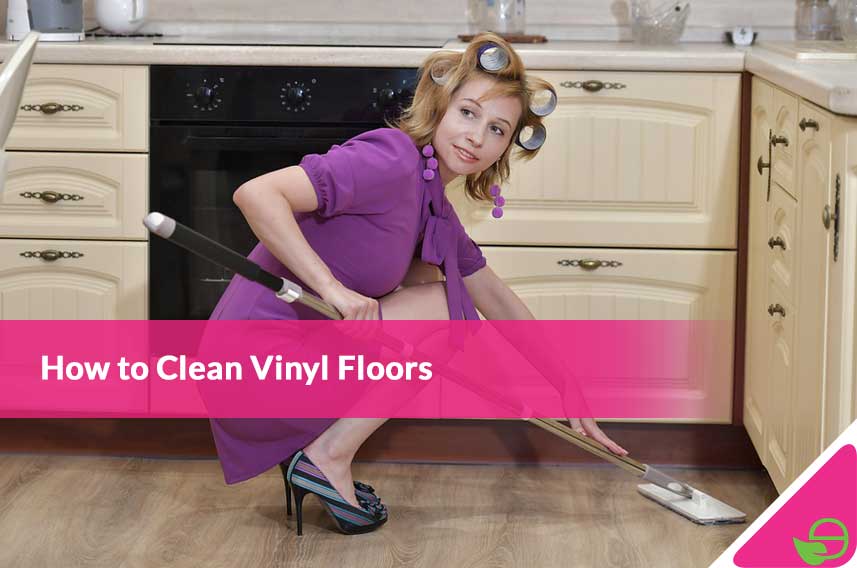Vinyl is a very popular material for flooring as it is versatile, relatively low maintenance and quite easy to clean.
Since vinyl is resistant to water and stains, it appeals to many homeowners.
Moreover it is quite resistant to damages.
Table of Contents
What is Vinyl Flooring
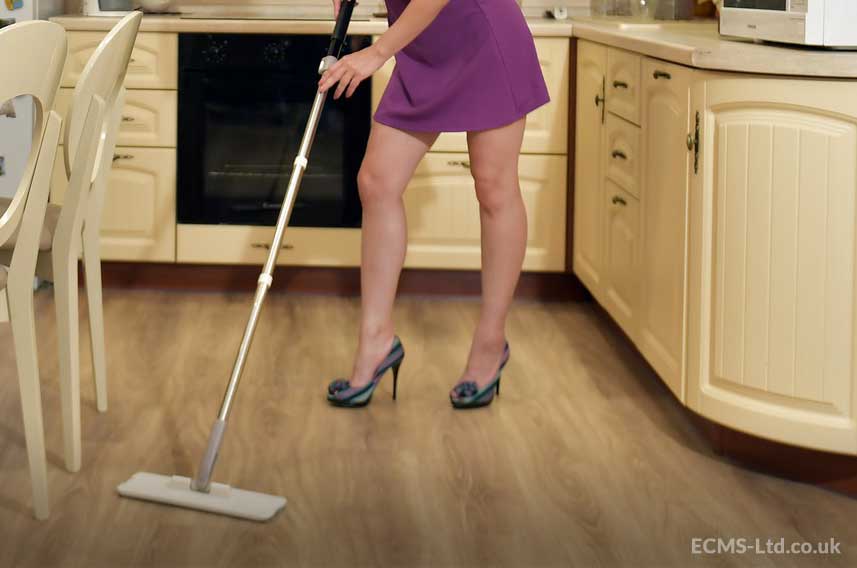
Vinyl flooring is commonly found in homes as well as business establishments due to its various advantages.
The material itself is composed of PVC along with a number of other compounds.
Vinyl is produced as floor tiles or as sheets which are applied to subfloors by means of mastic or a special adhesive.
Vinyl was originally intended as a replacement for the then popular rubber floors.
It is much more durable than the latter and unlike rubber flooring, it is not affected neither by oxygen exposure nor alkaline moisture.
Over the years, the popularity for vinyl flooring grew considerably and many commercial establishments opted for this flooring material as it is resistant and easy to clean.
Moreover, vinyl is available at various price ranges, making it ideal for any budget.
Advantages of Vinyl Floors
Durability
Vinyl flooring is very durable and resistant.
It can withstand heavy traffic, which is why it is so popular for commercial uses.
Typically a well maintained vinyl floor can last around 20 years despite having to handle high traffic.
In fact there are vinyl manufacturers who are able to offer a warranty of 15 years, which is really good when compared to other kinds of flooring materials.
As mentioned earlier, vinyl flooring is highly resistant, both to water as well as to most stains.
The fact that it is water resistant is why vinyl floors are so easy to clean as drying afterwards is not an issue at all.
Low Maintenance
When compared to other types of flooring materials, vinyl flooring is durable and low maintenance.
You will not have to worry about waxing it from time to time as you would with hardwood floors.
There is no need for resealing either.
All you will need to do from time to time is to have a mechanical buffer and chemical stripper to carry out a really deep clean or redo.
But this is not something that is going to be required that often.
Only in commercial places where heavy traffic is a daily norm, and after several years.
Low Cost
Vinyl is a very affordable option when compared to most other kinds of flooring materials.
Despite the fact that it is a low cost option that can suit anyone’s budget, there is also the advantage that there are countless options one can choose from.
Choice
If you are looking for a wide variety of colours and styles, you will be spoilt for choice with vinyl.
There are options that can suit any budget as well as any preference.
You will surely love the fact that there are vinyl flooring options that resemble wood, marble or stone, for instance.
They are very realistic and in some cases you won’t even notice the difference.
Simple Installation
You won’t need to worry about installing vinyl flooring.
Besides being relatively easy to install, it is also affordable too, unlike laying tile for example.
In fact many opt to install vinyl flooring themselves instead of hiring a professional as it is so simple.
All you will need to do is to apply it directly onto the existing flooring in most cases.
Comfortable Surface
Walking on vinyl floors is comfortable both in terms of the sound as well as the feeling of the surface.
Contrary to hard floors like tiles and natural stone, vinyl isn’t cold, so you can walk around comfortably even barefooted.
Besides, it is much softer too.
Types of Vinyl Floors
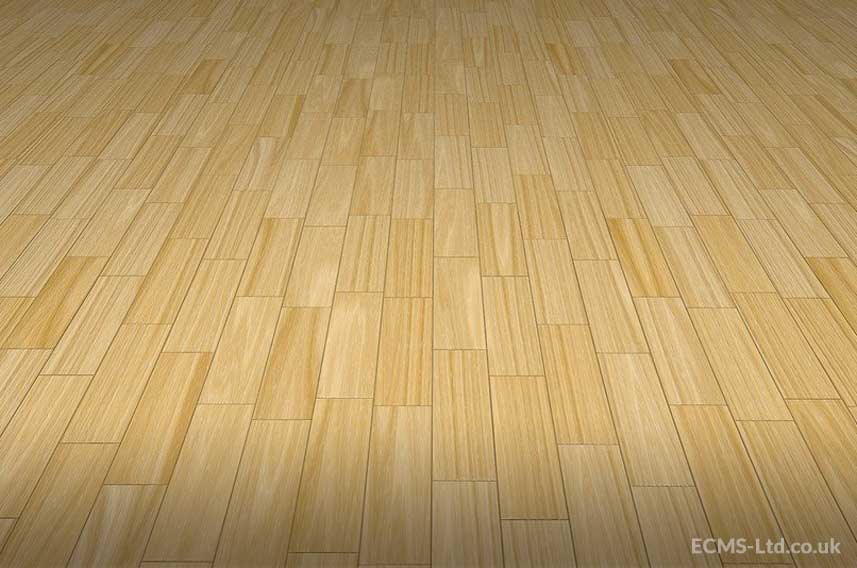
The following are the main types of vinyl flooring:
Click Vinyl Plank
Vinyl planks are quite popular as they look like wood.
However while they are very realistic they cost much less.
The planks look like real hardwood, but they have a nice, soft surface.
They are durable and easy to install.
Cleaning vinyl planks is also simple and you will not have to worry about the possibility of water damage as you would with hardwood flooring.
All you have to do is to mop them up with some vinegar or dish soap added to water.
Vinyl Tiles
Vinyl tiles are produced in the form of squares and are available in a variety of sizes.
They generally look like natural stone flooring, but are obviously much more low maintenance and affordable.
Regular sweeping or vacuuming to remove dust will suffice.
Once a week use a mixture of vinegar and water so as to mop up the floor to give it more shine.
This can be increased in frequency in case of high traffic areas.
Sheet Vinyl (Linoleum)
Sheet vinyl, also known as linoleum, is supplied in rolls.
These are usually 6 to 12 feet wide.
Since sheet vinyl is supplied in this way there are fewer seams and so there is no problem when it comes to high moisture areas like bathrooms.
Besides there is less place for dust to get trapped up, so you will only need to sweep it and mop occasionally.
Urethane Vinyl
Urethane is a layer applied to the top layer of vinyl flooring.
It is very durable and helps to add even more protection to the vinyl.
It makes vinyl more resistant to scratches and any scuff marks, and its original glossy finish can be retained even more thanks to this top coating.
Tools for Light Cleaning
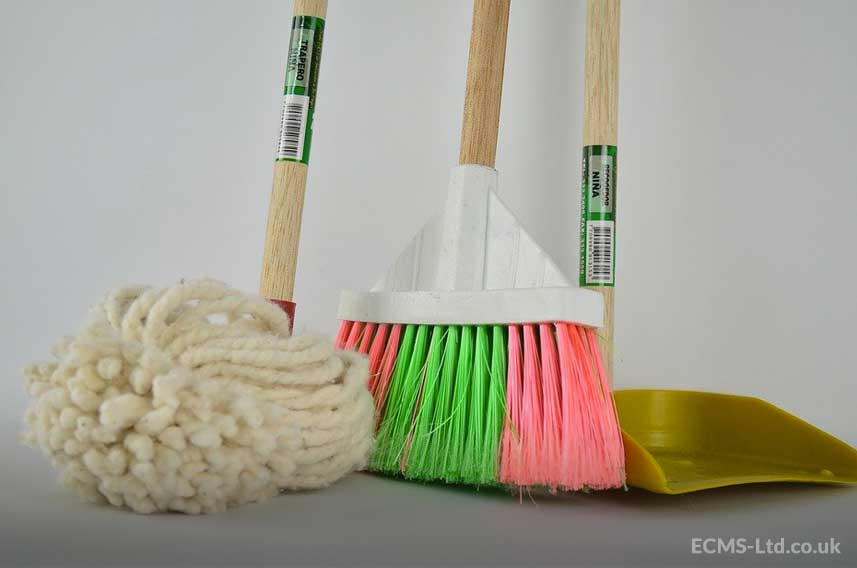
Vinyl flooring does not require much cleaning since it is water resistant and highly resistant.
The following are some tools you will need to carry out basic, light cleaning.
Broom & Brush
It is recommended to use a broom or brush with soft bristles to sweep vinyl flooring.
Even though the surface is resistant, you do not want to use rough brooms or brushes to sweep as you might scratch it slightly.
Dust Mop
A dust mop is good to have as you can get rid of small particles of dust, hair and other dirt easily.
Dust mops are preferred by many as they are easier and more convenient to use than brooms considering you just need to glide the mop across the floor.
Vacuum Cleaner
If you prefer vacuuming to using a broom or a dust mop, just make sure that you do not use the carpet attachments on your vacuum cleaner, as they will most slightly scratch the vinyl.
Tools for Deep Cleaning
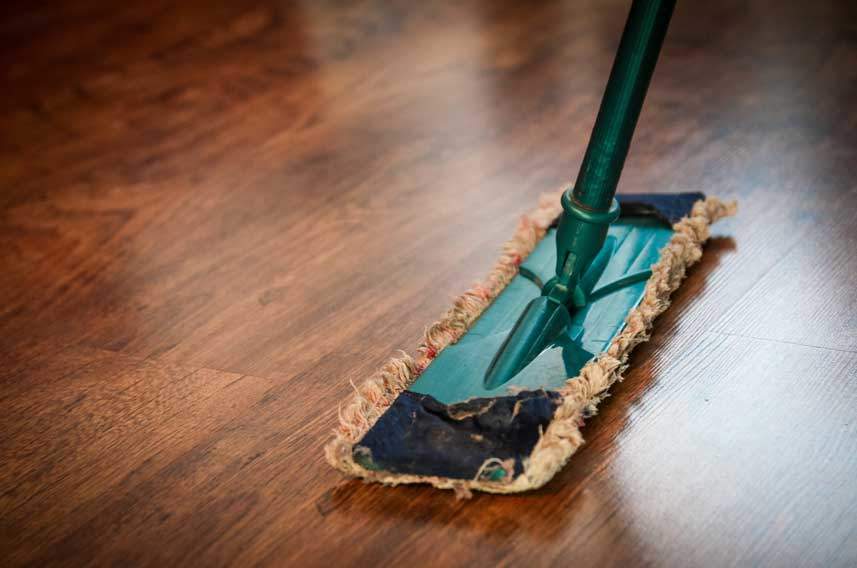
While regular cleaning is important for any floor, it is a good idea to offer your flooring a deeper cleaning every once in a while.
This will depend on the amount of traffic the floor is exposed to, so it may be enough to do this weekly, or on a monthly basis.
It is important to bear in mind that while vinyl is water resistant it is not waterproof, and hence you should not mop it too often as it might dull the finish and weaken the adhesive.
You do not want to use too much water as it might penetrate through the felt or foam that is underneath the vinyl and possibly cause mold or mildew.
Motorised Floor Cleaner
A motorised floor cleaner such as an electric spin mop can work very well for vinyl floors.
It can make the job quicker and effortless.
Spray Mop
Spray mops are another good option for vinyl flooring.
Since you would be spraying water you would be reducing the amount of water that could be left standing on the vinyl when mopping.
How to Clean Vinyl Floors
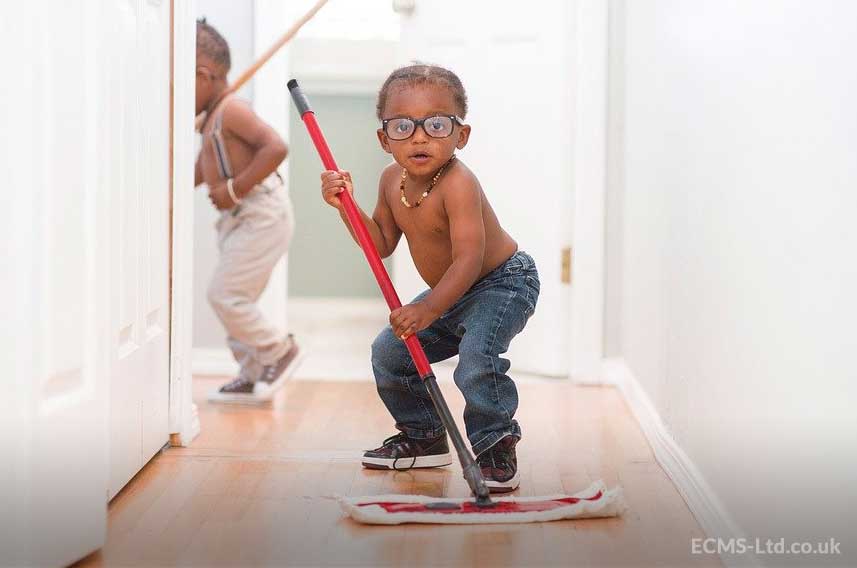
1. Remove Dust & Dirt
To get rid of dust and dirt it is important to sweep often, particularly any high traffic areas.
While vinyl is very resistant to scratches, it is important to make sure that you sweep often.
Any small grains of dirt might be dragged inside on the soles of shoes, and these could cause scratches.
To gather dust more easily from underneath furniture and close to baseboards you may wish to use a vacuum cleaner or a dust mop rather than a broom.
2. Cleaning Products
There are various cleaning products you can use to clean vinyl.
While there are commercial products, you can also opt for simpler options you can find in any home.
For instance, apple cider vinegar works very well for vinyl floors as it is mild yet effective.
You can also use normal dish soap as it works very well to get rid of all kinds of dirt as well as grease.
In case you have waxed vinyl flooring, make sure to choose a cleaning product that is suitable for a waxed surface.
Whereas if the vinyl is unwaxed you would need a no-wax cleaner.
3. Handheld Mops & Spin Mops
Bear in mind that you should use a minimal amount of water because even though vinyl is not porous it is not completely waterproof either.
When mopping, you can use either a handheld mop or a spin mop.
Start at the farthest part of the area or room, and work your way towards the door, while wringing the mop as you go.
If you notice that the water is getting dirty, change it.
4. Rinsing
It is very important to rinse the floor after you mop.
This is due to the fact that you may notice that a soapy residue might be left on the floor.
So by rinsing with clear, clean water you can achieve a better result.
Finally, dry the floor well using a clean floorcloth.
Removing Stubborn Dirt or Stains
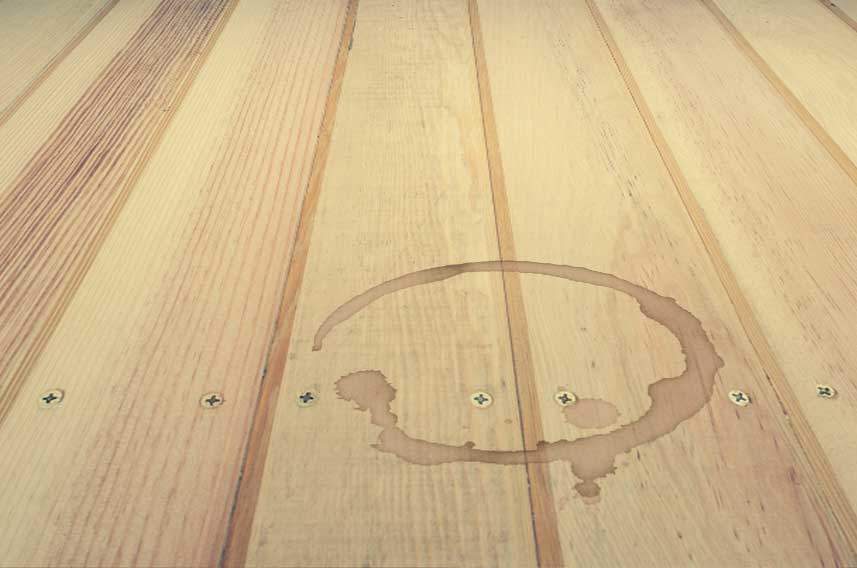
1. Scuff Marks
Scuff marks are a common problem with most floors, including vinyl.
However they are easy to remove.
All you need to do is apply some jojoba oil or some WD-40 on the marks, and rub well.
Scuff marks that are more persistent as they are older or deeper might need a bit more scrubbing, but in most cases they can be removed with this method.
2. Stains
The best method to remove most stains from vinyl flooring is by using baking soda.
It is a very effective way of cutting through most stains, including wine, juice, grease and most food stains.
Bear in mind that baking soda is rather abrasive.
So it is important to mix it equally with water, until you have a paste.
Before applying it make sure to wipe away any excess liquid.
While rubbing it in the stain you may wish to use a soft cloth.
3. Makeup or Permanent Ink
Rubbing alcohol is the best option in these cases.
It works very well as it lifts off the pigment from makeup or ink stains, and you will then be able to wipe it off effortlessly.
In case of spilled nail polish, you should apply some acetone-free nail polish remover.
But make sure it does not contain acetone, as otherwise it would damage the vinyl.
4. Scrubbing
In case of other kinds of stains which seem to be somewhat persistent, you will need to scrub.
The best way to do this is to use a soft nylon brush.
Avoid any stiff brushes, steel wool or anything that feels too abrasive for vinyl as you would end up scratching the surface.
Prior to starting the scrubbing process, always apply some form of stain remover, such as the baking soda paste mentioned earlier.
Do’s & Don’ts
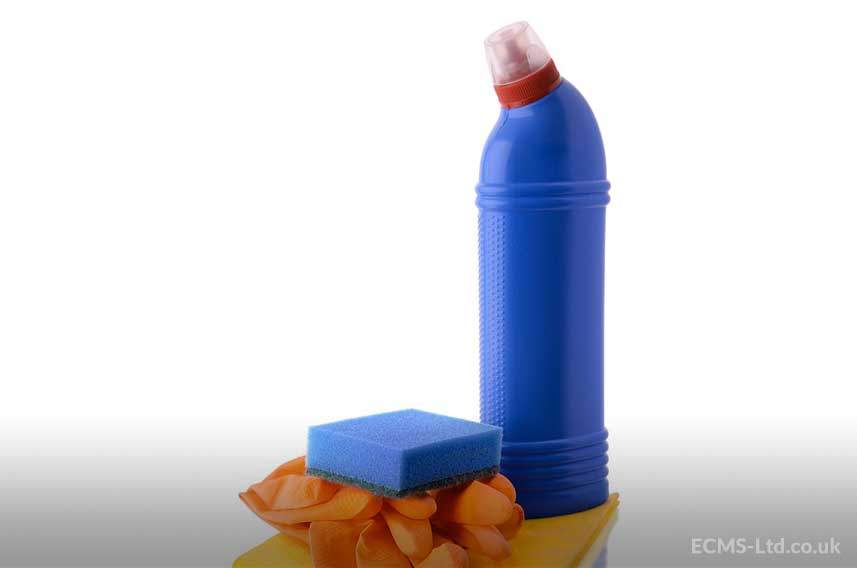
The following are some general pieces of advice with regard to maintaining vinyl flooring in tip top condition, and improving its longevity with some precautions.
1. Sweep Frequently
It is important to sweep frequently to prevent any small particles from causing any scratches.
2. Cleaning Techniques
The cleaning techniques used need to be suitable for vinyl.
As mentioned earlier, you need to avoid anything that is too abrasive as vinyl flooring is quite soft.
Never use too much water and once you are done mopping, always dry well.
3. Use the Right Chemicals
Using suitable cleaning products is very important.
There is no need to buy commercial products as anything as simple as dish soap can work very well for vinyl floors.
You can also stick to apple cider vinegar as it is a good option.
Having said that, if you still prefer a commercial cleaning product, make sure it is a specialised cleaner for vinyl floors, and that you follow the instructions well.
Never use any bleach or other abrasive cleaners, especially if the vinyl has a shiny finish.
4. Avoid Soaking
One of the worst things you can do when cleaning vinyl is to soak it with too much water.
If too much water is left on the surface, it will seep in the seams and edges and end up ruining the adhesive underneath the vinyl or rot the sub-floor.
5. Floor Protectors on Furniture
As a precautionary measure, you should always use floor protectors on any furniture or appliance.
Heavy items will easily cause deep dents and even scratches.
With something as simple as floor protectors fitted to the furniture bases or feet, you would be preventing this from happening.
Should you need to drag or push anything heavy, it is of paramount importance not to do this if your floor is a vinyl floor.
This is very important when new furniture or appliances arrive, or when you are moving.
Otherwise you will most probably scratch and scuff your vinyl surface.
It is best to always lift instead of dragging anything heavy.
If this is not possible, use plywood sheeting throughout the rooms where the item needs to be taken, to push it over them instead of on the floor.
Rolling casters are not recommended either as they can cause scratches as well.
It is also a good idea to use rugs for heavy traffic areas, and to place door mats at doors.
This will help to reduce the dirt that vinyl floors will be exposed to.
6. Avoid Shoes & Heels
Since vinyl is soft it is very important to avoid walking on it with shoes, especially those that have heels as they can cause dents.
Conclusion
A well maintained vinyl floor can last a long time.
And, the best thing about vinyl flooring is that it is easy to clean.
A regular sweeping or vacuuming can keep your vinyl floor free from dust particles.
Mopping should not be done too often, and whenever you do, make sure to use a suitable cleaner and avoid using too much water.


